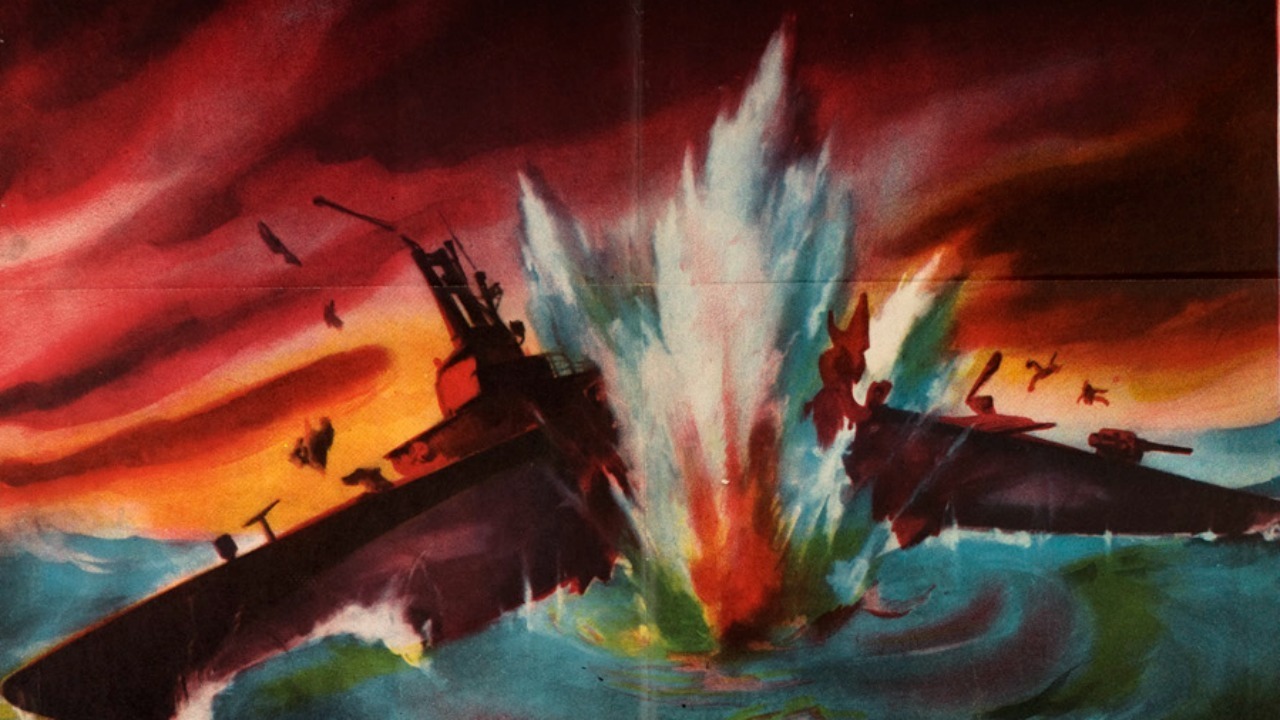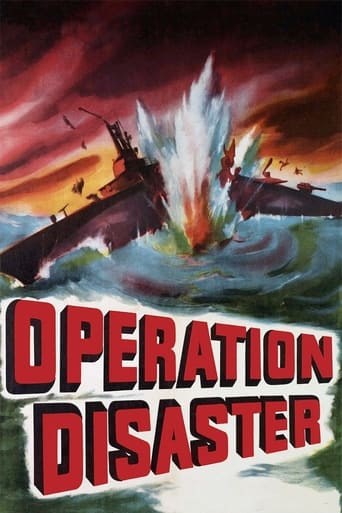SunnyHello
Nice effects though.
Lollivan
It's the kind of movie you'll want to see a second time with someone who hasn't seen it yet, to remember what it was like to watch it for the first time.
Guillelmina
The film's masterful storytelling did its job. The message was clear. No need to overdo.
Cassandra
Story: It's very simple but honestly that is fine.
Robert J. Maxwell
A British submarine, Trojan, accidentally runs into a drifting mine that blows off her bow and floods her stern. The central section sinks to the bottom with twelve men left alive. Submarine rescue ships come to her aid but it's a long hard slog, introducing air into the hull and trying to lift the wreck with wires. There is a means of escape from the submarine but it will accommodate only eight of the survivors, leaving four men (chosen by lot) to a problematic future.Frightened men trapped aboard a disabled submarine at the bottom of the ocean. You'd expect a lot of drama, speech making, and philosophizing on what it's all about. Well -- there is a little of that, but not too much.The drama centers around the stoker, one of the four losers, played by a baby-faced Richard Attenborough. When the boat is disabled, he reveals himself as a sniveling coward. (Note: No cowardice is complete without its "sniveling" qualifier.) But in the course of their isolation, the four remaining men are drawn together and Attenborough learns to overcome his fear and to care for a shipmate who is sick.John Mills is the captain who remains behind. And aside from Attenborough, there are also Wylie Watson as the comical but sensitive cook who doesn't know how to pronounce the word "Pisces" in the Astrology column, and Nigel Patrick as Number One.Happily, although these four are stuck in a disabled undersea wreck, the film makers are not. Scenes in the submarine alternate with the efforts of those ashore and those in the rescue craft to haul the mauled hull to the surface. These men are led by the reassuring Bernard Lee. Lee is a fine actor but, as it turns out, can't solve every problem that comes along.Because we are able to keep abreast of the rescue efforts and the difficulties involved, we're spared the isolation and claustrophobia of that sunken wardroom. This turns what could have been an ordinary, stiff-upper-lip talkfest into a rather dramatic and well-done story of men facing death while others try to help them.It's based on a play. I can't imagine a play about a situation like this being anything but deadly, but it's a nicely executed film. Good and craftsmanlike.
screenman
Here's a very rare movie about submarine disaster. In fact, I don't rightly know of another. Perhaps because its the worst-case scenario for submariners and exposes the evident command futility in a crisis that other countries have not wanted the images portrayed. Having the courage merely to tackle such an awkward subject then certainly deserves some stars.Life for submariners routinely entails a quantum leap of hazard compared to those within surface vessels. Anything going wrong - anything at all - might compromise the vessel and its crew. And this is what happens. John Mills - that diminutive, but ever-present military stalwart of the time - commands a British submarine out on 'routine' patrol. Things go wrong. It sinks within its test depth. Can the crew be rescued? There's a thoroughly decent cast make-up the crew, including Richard Attenborough (who goes to pieces once more, as he did in Coward's 'In Which We Serve'). All of the usual issues are addressed, and to that extent it's pretty formulaic. Where it differs from any other formula movie is that non of the solutions work.A residuum of crew are doomed to death.As I say; it's a grim little movie that ultimately evaluates reconciliation to the last hours of life. Submariners of Britain, USA, and Russia have all experienced this nightmare, as indeed have their families ashore. And although submarines have been around for over 100 years, even now there appears to be no dedicated response or recovery protocol either at a national or international level, as the relatives of the Kursk's crew discovered only too well.If you have friends or relations serving in the silent navies, you may want to give this a miss. Otherwise dismiss its vintage and pay attention. What would we do today?
theowinthrop
Every now and then we are reminded of the so-called "silent service" - the submarine arm of the navy. It is hard to believe nowadays but active use of submarines in warfare is barely over one century old. There had been three attempts at getting submarines into warfare before the 1880s: in the American Revolution, when Connecticut inventor David Bushnell designed the "Turtle" to attack Admiral Howe's flagship in New York Harbor; when Robert Fulton attempted to interest Napoleon Bonaparte in his submarine as a weapon against the British fleet in 1800; and when the Confederate (and Northern) navies experimented with torpedo boats and submarines - culminating in the success of the C.S.S. Hunley - in the American Civil War. But the real spur was anti-British animus in Irish-American circles in the 1880s, when they financed the researches of John P. Holland. It was his successful submarine that became the model adopted by most navies.But that was after 1900, and the early submarines were small and unpleasant and smelly craft (due to the closed space and the gasoline fumes). Disasters occurred frequently enough. It was not until the sinking of three British cruisers on one day in 1914 by U-boat Captain Weddingen that their power became widely realized. The number of maritime fatalities (led by R.M.S. Lusitania) demonstrated how deadly these ships could become. So by the end of the war everyone was improving their submarine fleets.But the ships still had major disasters in the 1920s and 1930s. 1939 was a banner year with major French, British, and American sub disasters. But the last one, the U.S.S. Squalus off Portsmouth, New Hampshire, was important for another reason. For one of the few times in modern history, the crew of a disabled submarine was mostly rescued. Diving bells and decompression chambers saved nearly two thirds of Squalus' crew (and the sub was raised, repaired, and recommissioned to be of use in World War II). But Squalus sank very close to land, and the depth was not an impossibly deep one as a result. Still it was quite a rarity to have survivors of a sub sinking. With a normal shipwreck (of a surface vessel) the crew has a chance to use lifeboats, life preservers, floating wreckage, rafts. You can't readily do that if you are underwater to begin with.For some reason submarine disaster films have rarely appeared on screen. There were films about submarines (several versions of Jules Verne's TWENTY THOUSAND LEAGUES UNDER THE SEA, for instance), and even of the wartime subs. For instance RUN SILENT, RUN DEEP, and DESTINATION, TOKYO were two. Some misfires also appeared. Charles Laughton appeared as an insanely jealous submarine commander opposite Gary Cooper and Tallulah Bankhead in THE DEVIL AND THE DEEP (he scuttles his own vessel at the end, going down with the ship). But films about actual tragedies never popped up. Except for this British film.John Mills is the commander of a submarine out on maneuvers in the British Channel. A mechanical failure causes it to sink. Mills is able to get most of his men out using snorkel breathing apparatus, and shooting them out of the torpedo tube. But he is unable to do it for the last three men in the sub with him: James Hayter, Richard Attenborough, and Nigel Patrick.In their situation they have to just wait out official attempts at rescue. But this is based on the amount of oxygen left on board, and how long it will last. Also, it is turning the ship into a huge tomb for them. And Attenborough, who has claustrophobic problems to begin with, is going over the edge. Patrick turns out to have physical problems that if not treated will possibly be fatal. It is not a happy situation.It is a gritty little movie, and it has it's moments of unexpected reality. Hayter was not supposed to be on the cruise, but at the last moment he agreed to go in place of a fellow seaman who had to attend an ailing wife. Details like that make one realize what a gamble our daily life experiences can be.As a look at a disaster that is normally uncommon (but still possible - remember the Russian tragedy of the "Kursk"), with four good performances in it, I strongly urge catching this film.
paulyboy
Morning Departure had a somewhat slow beginning but it quickly immerses you in the characters and their relationships with one another and with their duty. Whereas a lot of movies these days really try and make you care about the characters by the end of this movie your wondering if there is anything you could do at home to help them out! I actually saw this movie for the first time about 3 years ago but seriously rate this as my favorite movie to date when not influenced by current blockbusters.

